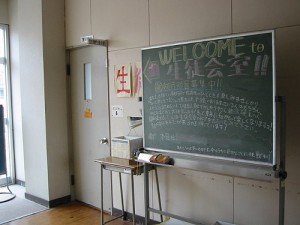Ijime – the Japanese word for “bullying” – is still a worrying social phenomenon in Japan, despite the “latest” surveys published by the Japanese Ministry of Education [pdf, ja] (no data after 2007 is available) appearing to show how the cases of bullying at school have decreased by 7.1% in later years after a high in the years 1997-98 [ja].
It seems that although bullying at school is regarded as a problem in many parts of the world, especially in Japan a great number of education experts, NPOs [ja] etc. fear its unforeseeable consequences, particularly in social environments where there is a lack of communication between parents and children, or between teachers and students. Only a few weeks ago, for example, the Japanese public opinion was shocked by the case of suicide of a 16 y.o. high school student, who in a death message said the bullying acts he had been subjected were the cause of his extreme act.
Struck by this tragic episode, blogger remina tells of her experience as the parent of a second year elementary school student who has been a victim of bullying.
いじめといえば、最近のわが子もそう。
まだ幼いので、すぐに言ってくれたので、対応はできました。
でも、それまではいつも変わらない態度だったので、気づきませんでした。
そう考えると、どういう風に子供はSOSを出しているのか。
ちょっと気にするようになりました。
学校は子供たちでの生活。できれば子供たち同士で解決ができればよいのだけれど、なかなかそうもいきません。
で、「親も、子供の喧嘩に親は出てはいけない。」と思い、なかなか知っていても学校へ相談することも難しい。
This made me wonder: how do children send us an SOS?
School is where children spend time with other children and, whenever possible, it's better if kids solve their problems by themselves, but sometimes things are not that easy.
I believe that parents should try not to meddle in kids’ affairs. It's difficult for me to talk to the school about things even if I'm aware of certain things.
どうして悪いのはいじめている子なのに、いじめられると気を使うんでしょうか。
私は納得がいかず、担任の先生にすぐに相談します。
今の学校の先生はすぐに対処をしてくれますし、いじめているお子さんに行って欲しくなければ、周りの子に事情を聴き、判断をして、どうするかを相談してくれます。
[…]
いじめはどういうものかは人それぞれ。
注意をしていないと子供もこれがいじめだとは知らなかったと言いかねません。
注意をしてまだするようでは、いじめだと知っていての今度は行動になります。
いじめは逃げていてはいつまでたっても解決はしませんし、
子供も引きこもりや登校拒否にならざる得ません。
子供のSOSに気づいたら、
子供の気持ちも考えながら、対処をしてあげてください。SOSは、色々ありますが、今まで学校のことを話していたのに、
急に話さなくなった。または、いつも出てきた子供の名前が出てこなくなった。最近甘えてくる。給食でお代りをしていたのに、最近していない。
わが子は小学校2年生なので、小さいお子さんに限ってのことですが、いじめられているとわかった段階での最近の子供の様子がいつもとおかしかったかな?という点を挙げてみました。
There are many types of signals. Your child stops talking about school or stops mentioning certain friends that he used to talk about all the time. He is more demonstrative than usual. He stops having second helpings for lunch.
When I first became aware that my son was being bullied, I looked back on his recent behavior to look for signs. The ones above were the signs that hinted that something was going on. Since my child is an elementary school student in his second year, these signs will mainly fit young children.
いじめられると心が鍛えられるというけれど、
結局人間不信になるだけです。
事が大きくなれば子供の心の傷つくのも大きくなります。
小さいうちに早く摘むことができれば・・・・
It is much better to put an end to problems while they are still manageable…
Another important illustration given by rhsion may give an idea of how the educational system in Japan is still inadequate and not supportive to the children and their families.
先週の土曜日。
上の子が泣いて帰って来ました。
どうもいじめに合ったようです。
内容を聞いてみると、
最初は、上級生に顔面にボールをぶつけられて『手が滑った』と言われ
その後違う子から顔面に石をぶつけられ、ボールをぶつけた上級生は
その後顔面に蹴りを入れたそうです。
上の子の顔を見ると右目の横が腫れて血が出ていました。
子供のじゃれあいの喧嘩なら良いですが、ちょっとやり過ぎだと思い今日学校に電話をしました。
When I looked at my son's face, his right eye was swollen at one side and there was some blood.
If it had been only a kids’ matter, a simple fight, I wouldn't have said anything but this time they had gone too far, so I called the school.
学校の反応もいつも通り。
『子供に状況を確認します』との事。
今日夕方、先生が事情を説明に家に来るんだろうなあ~~~。
毎度の事ですが・・・。
いつも上級生によるいじめ。
His teacher will probably come to our home this evening to explain what had happened. He does this every time and he always says the same thing: my child has been bullied by his older schoolmates.
今までにも、多少のいじめはありました。
『頭に唾をかけられる』『仲間はずれ』『教科書の紛失』・・・・。
自分の子にも原因があるのは分かっているのですが・・・。[…] 私の子は、生まれながらに脳に障害を持っています。
海外では、専門の学校があるみたいですが・・・日本の医学では追いついていないのが原状です。
一件見た目は、普通のこと変わらない。
だから障害者にもならない。
普通と障害者の間のような存在。
My child looks is like any other at first sight, and that is why he is not considered ‘disabled’. His condition is somewhere between that of a normal person and that of a person with a disability.
[…]
学校には周知徹底をお願いしているのですが・・・。
子供には、見た目普通の事変わらないので伝えるのは困難です。
子供の話はいつも途切れ途切れですので・・・。
それを一つ一つメモにとって、いつも担任に報告。
His speech is always broken so I take note of everything he says and report it to his homeroom teacher.
[…]
もう少し医学が進歩して子供が安心して学校に行けるようになってもらいたいものです。








4 comments
Sorry to stray from the topic a bit, but does anybody have more information about the state of children with disabilities in Japan? I live in Japan and have always had the impression that there are a lot more children with disabilities to be found here than in most other countries I’ve been to. There are a few in the neighborhood and through my wife’s work (helper) I know a handful personally.
Are they mostly being shuffled out of sight or “cured” in other countries, or is there a specific reason for there being more kids with disabilities in Japan?
Any insight would be appreciated.
> Dav: I’m sorry but I don’t know much about the state of the disabled children in Japan.